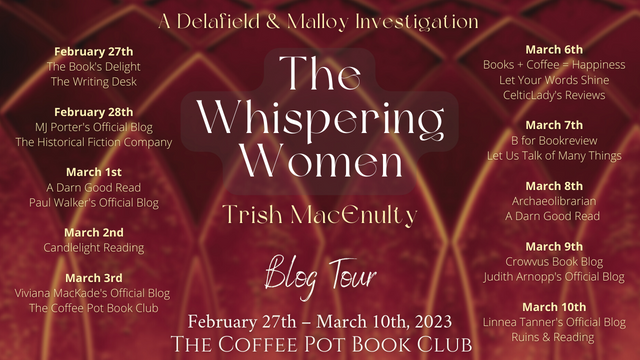
10 Mar The Whispering Women Trish MacEnulty #historicalfiction #historicalmysteries #BlogTour #TheCoffeePotBookClub @pmacenulty @cathiedunn
FEATURED AUTHOR: TRISH MACENULTY
I am pleased to feature Trish MacEnulty in The Coffee Pot Book Club Blog Tour being held between February 27th — March 10th, 2023. She is the author of the Historical Fiction / Historical Mystery, The Whispering Women (Delafield & Malloy Investigations), released by Prism Light Press on September 6th, 2022 (387 pages).
Below are highlights of The Whispering Women, Trish MacEnulty’s author bio, and her guest post about 1910s women playing a huge role in reforms in spite of (or perhaps because of) being shut out of politics.
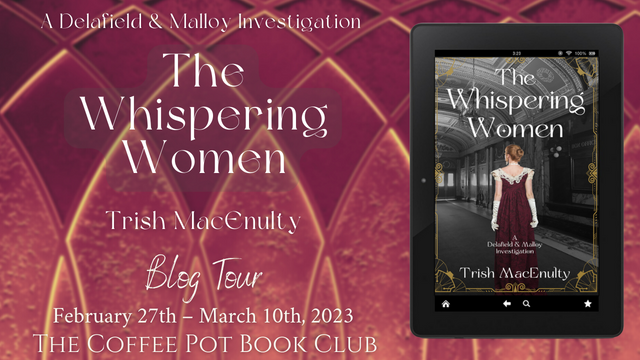
To Follow the blog tour, CLICK Tour Schedule
HIGHLIGHTS: THE WHISPERING WOMEN
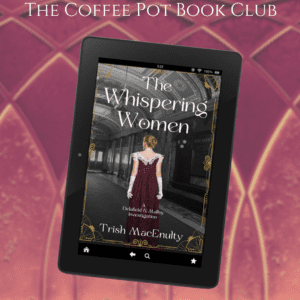
The Whispering Women
(Book #1, A Delafield & Malloy Investigation)
by Trish MacEnulty
Blurb:
“Richly drawn characters, the vibrant historical setting, and a suspenseful mystery create a strong current that pulls readers into this delightful novel. But it’s the women’s issues—as relevant today as they were in the early 1900s—that will linger long after the last page.” — Donna S. Meredith, The Southern Literary Review
Can two women get the lowdown on high society?
“Two powerless young women must navigate a soul-crushing class system and find the levers of power they wield when they combine their strengths. These women may have been taught to whisper, but when their time comes, they will roar.” — 5 Star Amazon Review
Louisa Delafield and Ellen Malloy didn’t ask to be thrown together to bring the truth to light. But after Ellen witnesses the death of a fellow servant during an illegal abortion, Louisa, a society columnist, vows to help her find the truth and turn her journalistic talent to a greater purpose.
Together, these unlikely allies battle to get the truth out, and to avenge the wrongful death of a friend.
What will our heroes do when their closest allies and those they trust turn out to be the very forces working to keep their story in the dark? They’ll face an abortionist, a sex trafficking ring, and a corrupt system determined to keep the truth at bay.
“If you like historical fiction and if you like mysteries, this one is for you!” — 5 Star Amazon Review
Was change possible in 1913?
To find out, read THE WHISPERING WOMEN today!
Buy Links:
The books in this series are available to read on Kindle Unlimited.
Universal Link Amazon UK Amazon US Amazon CA Amazon AU Barnes and Noble
BOOKS IN THE SERIES
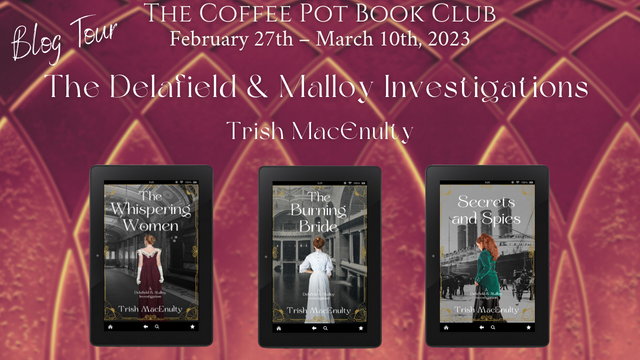
The Whispering Women (Book #1, A Delafield & Malloy Investigation)
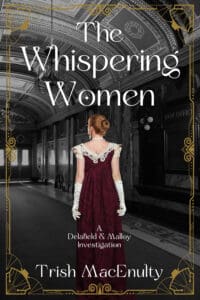
The Burning Bride (Book #2, A Delafield & Malloy Investigation)
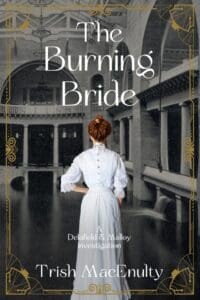
Secrets and Spies (Book #3, A Delafield & Malloy Investigation)

AUTHOR BIO: TRISH MACENULTY
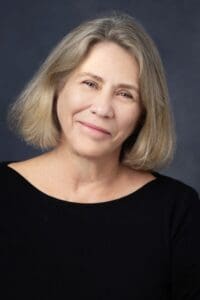
Trish MacEnulty is a bestselling novelist. In addition to her historical fiction, she has published novels, a short story collection, and a memoir. A former Professor of English, she currently lives in Florida with her husband, two dogs, and one cat. She writes book reviews and feature articles for the Historical Novel Review. She loves reading, writing, walking with her dogs, streaming historical series, cooking, and dancing.
Social Media Links:
Website Twitter Facebook Instagram Book Bub Amazon Author Page Goodreads
GUEST POST BY TRISH MACENULTY
The 1910s comprised a powerful era for reform, and women played a huge role in those reforms in spite of (or perhaps because of) the fact that they were shut out of politics.
One group, in particular, included wealthy women who had a sense of noblesse oblige and were determined to uplift society in general. Of course, not all wealthy women felt a sense of responsibility to the larger society, but enough of them did and they actually made a significant difference.
These women were especially motivated when it came to securing the right for women to vote. Here’s a wonderful tidbit from Joanna Neuman’s excellent book Gilded Suffragists:
“Kathrine Houghton Hepburn was president of the Connecticut Woman Suffrage Association and an ally of birth control advocate Margaret Sanger. As her daughter, actress Katharine Hepburn told biographer A. Scott Berg, ‘Mother’s secret was in remaining extremely feminine. She dressed beautifully, she showed off her well-groomed children. And then, while she was pouring the mayor a second cup of tea, she would discuss with great intelligence some great injustice being heaped upon his female constituents.’” (Page 4)
It’s no surprise that Katharine Hepburn, who so often played strong, willful characters, was the daughter of a feminist!
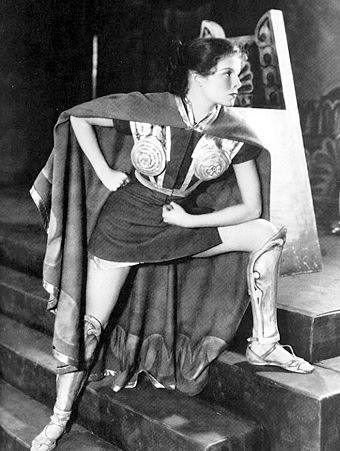
Katharine Hepburn in The Warrior’s Husband, 1932
Neuman’s informative book was a great help as I created a character named Hester French, who becomes Ellen’s lover in my book The Whispering Women. An ardent reformist, Hester typifies the sort of wealthy woman activist who visits the tenements to help the poor, advocates for children’s safety, and ardently and passionately fights for women’s suffrage.
Here’s an excerpt from The Whispering Women. It takes place during the 1913 Women’s March on Washington — for the vote!
“Ladies, we’ll be marching down Pennsylvania Avenue to the White House. Be careful, as there will be large crowds due to the inauguration tomorrow. But we have been promised police protection,” the New York marshal assured them. Hester stayed in the back with Ellen.
“Why aren’t you up there with the society girls?” Ellen asked.
“My sister and I are from Pittsburgh. We’re not old New York money even though we have as much as any of them. So we’re not accepted into their society. It drives my sister crazy. I couldn’t care less,” she said.
“You are full of surprises,” Ellen said.
Then the march began. A band at the front played a rousing march. The women stood four across and walked steadily up the broad avenue along the streetcar tracks toward a domed building.
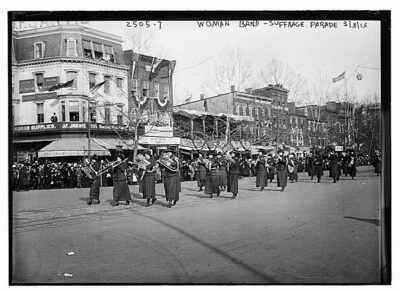
Woman Band in the Women’s Suffrage Procession
Alongside the marchers, crowds lined up behind a wire cable. Ellen marched shoulder to shoulder with her delegation behind Inez Milholland, who could have been Joan of Arc. …They hadn’t gone far when the march simply stopped. An elderly woman leaned on her cane for support. … Ellen looked around, wondering why they were stopped.
“What’s going on?” a voice cried out.
“What’s happening?”
“Why are we stopped?”
Bodies pressed around her. Word came back from the front lines that the spectators were no longer held back by the wire cables. They came in so thick that the procession could not pass. Ellen stared at the burgeoning numbers of watchers — mostly men, a sea of brown suits.
“Go home and make supper!” a man shouted, his mouth twisted in rage. Foot by foot, the woman moved forward, but the crowd grew thicker with every block. The women, who were walking four to a line, shrank together, shoulders touching. Men cat-called and laughed. The press of bodies was suffocating.
“Where are the police?” Hester asked.
“They’re not doing anything,” an angry woman yelled.
Sure enough, a policeman stood at the edge of the crowd with his arms crossed, laughing with the men who shook their fists and hollered at the marching women.
“You need a man to teach you how to be a woman? I’ll teach you,” a young man screamed at them with a hideous leer on his face.
Suddenly they surged forward, and someone shoved her hard from behind. She dropped her sign, wheeled around, ready to fight, and saw a phalanx of men, laughing and jeering and pushing the other women back. Ellen was trapped like a hunted fox, surrounded by baying hounds.
“I’ll show you what a woman’s meant for,” a pug-ugly man said, spewing rancid breath into her face. She threw a punch toward him, but another man grabbed her hand and pulled. A man with a cap pulled low over his forehead pushed through the crowd of men and glared at her. …He wasn’t drunk like the other men; his pale eyes were filled with malevolent intent. A knife blade flashed in his hand. She stepped back, tripped, and fell to the ground. The man came closer, looming over her. Her legs got tangled in her skirt as she flailed on the ground, but she rolled away as he jabbed the knife toward her.
All of a sudden, the man yowled. A cane sliced through the air and landed on the back of his skull again and again. He turned, and all Ellen could see in the melée was an elegant patent leather boot with a Louis XVI heel kicking him in the arse as he ran away. Then Hester reached for her. Ellen grabbed her hand, and felt the strength in the bones, the firm flesh, and something like sunlight breaking through clouds. She rose to her feet as other women shouted and beat back the men who had surrounded her. Hester returned the cane to an older woman who stood by, cheering.
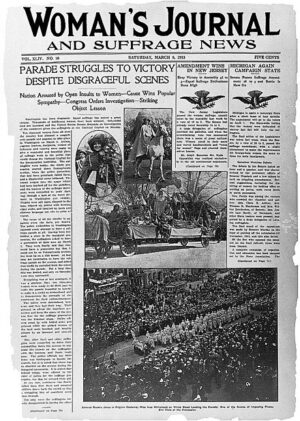
Women’s Journal, 1913
While Hester is a fictional creation, in the next two books in the series, real-life historical figures make an appearance.
In The Burning Bride, Ellen meets Emma Goldman, the founder of the anarchist magazine Mother Earth. Emma Goldman is a fascinating woman. In her early years, she planned the assassination of Henry Frick (no innocent himself!) with her lover Alexander Berkman. Their plans went awry, and she later disavowed violent tactics. In fact, she became a renowned speaker who traveled the country, advocating for women’s rights, prison reform, and the rights of homosexuals (the term LGBTQ was not in use at that time). She later opposed entering the Great War and wound up being put in prison, after which she was deported to Russia.
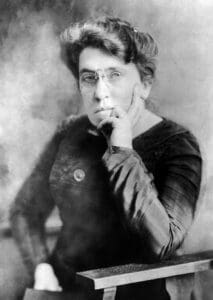
Photo of Emma Goldman
Finally, in my third novel of the series, Secrets and Spies, Ellen meets Jane Addams, the founder of Hull House, a settlement house in Chicago, and a peace activist during the Great War. (Settlement houses provided services for immigrants and sought to alleviate poverty.)
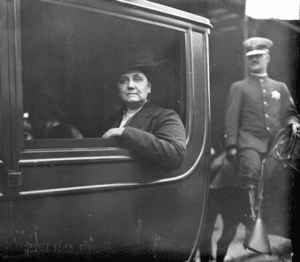
Photo of Jane Addams
Here is an excerpt from Secrets and Spies about Jane Addams’ 1915 speech in Carnegie Hall, based on primary sources:
Addams was introduced shortly and took the podium. She seemed daunted by the size of the crowd, but she quickly gained confidence as she began to speak of her experiences. She talked about the women’s conference at the Hague, how German women and French women and British women and Russian women and Belgian women and American women all came together to share their stories, to create friendships and to make resolutions, demanding peaceful negotiations among the combatants. Her voice gained strength as she became more impassioned.
Toward the end of the speech in a ringing voice, she said, “The old notion that you can drive a belief into a man at the point of a bayonet is in force once more. It is quite as foolish to think that if militarism is an idea and an ideal, it can be changed and crushed by counter-militarism or by bayonet charge!”
The audience hung on every word, nodding in agreement among themselves, but the next thing she said caused a strange hush to fall over the audience.
“And the young men in these various countries say of the bayonet charges: ‘That is what we cannot think of.’ We heard in all countries similar statements in regards to the necessity for the use of stimulants before men would engage in bayonet charges – that they have a regular formula in Germany, that they give them rum in England and absinthe in France; that they give them the ‘dope’ before the bayonet charge is possible. Well, now, think of that.”
Ellen is only one of my main characters. The other is Louisa Delafield, but Ellen is the one who is most prone to meeting activists.
 Instagram: @thecoffeepotbookclub
Instagram: @thecoffeepotbookclub


Cathie Dunn
Posted at 04:38h, 10 MarchThank you so much for hosting Trish MacEnulty today, Linnea. Such a fascinating post. xo
Linnea Tanner
Posted at 10:13h, 10 MarchHi Cathie–It was my pleasure to host Trish MacEnulty. The early 1900s is such a fascinating period with the suffrage movement and the fight for gender equity.
Jan Sikes
Posted at 08:51h, 10 MarchI love stories about strong empowered women and this book sounds like it is just that. Thank you for sharing, Linnea, and congrats to Trish!
Linnea Tanner
Posted at 10:18h, 10 MarchHi Jan–Thank you for visiting and commenting on the post by Trish MacEnulty. I find it inspirational to learn more about women who had to fight for social equity in the early 1900s. The books in the series sound both intriguing and informational. It’s a shame these women’s stories are often ignored in history classes.
Christy B
Posted at 13:57h, 16 MarchThere’s so much to uncover here – And that part about Katharine Hepburn’s mom is something I didn’t know! The book series sounds fantastic.
Linnea Tanner
Posted at 02:31h, 17 MarchHi Christy–Thank you for dropping in and leaving your comment. This is an era in American history with the Suffrage Movement, which I am interested in. Colorado, the state I live in, was the 2nd state to approve women’s right to vote with a referendum in 1893, more than twenty years before the US passage in 1919. I feel that we have gone backward on women’s rights with the overturn of Roe vs. Wade and the draconian anti-abortion measures that some states have adopted that will criminalize health professionals and jeopardize women’s lives.